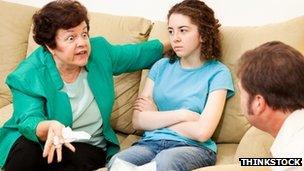Overprotected children 'more likely to be bullied'
- Published

Parents need to let their children learn to be resilient
Children who have overprotective parents are more likely to be bullied by their peers, research suggests.
A review of 70 studies looking at 200,000 children suggests parents who "buffer" children from negative experiences make them more vulnerable.
But children who have harsh or negative parents are most likely to be bullied, it finds.
Prof Dieter Wolke said everyone looked at schools, but his study says bullying really starts at home.
The University of Warwick-based psychology professor said he was expecting to find that children with the harshest parents were most likely to become prey to bullies.
But he said he was somewhat surprised to discover that children with overprotective parents were also at an increased risk of bullying.
'Deal with conflict'
He said: "Although parental involvement, support and high supervision decrease the chances of children being involved in bullying, for victims - overprotection increased this risk.
"Children need support but some parents try to buffer their children from all negative experiences. In the process, they prevent their children from learning ways of dealing with bullies and make them more vulnerable."
He added: "It is as if children need to have some distress so that they know how to deal with conflict. If the parents all the time do it for them then the children don't have any coping strategies and are more likely targets."
Bullying was defined as repeated instances over a six-month period, rather than just one-off conflicts in the playground.
He said the research suggested bullies find dominance by targeting the children they find to be the most vulnerable - picking again on the ones who cry or run away after an initial attack.
So the way a child reacts to an initial instance of bullying has repercussions for what the bullies do next. Once they have established who to target they increase their dominance by repeatedly victimising them.
'Clear rules'
The research, which covered a number of European countries and the US, also found that children who were bullied by their siblings were more likely to be victims as well.
Prof Wolke said: "Parenting that includes clear rules about behaviour while being supportive and emotionally warm is most likely to prevent victimisation.
"These parents allow children to have some conflicts with peers to learn how to solve them rather than intervene at the smallest argument."
Overall he found that 32% of children said they had been bullied over the previous six months. Some 10 to 14% went on to be chronic bullying victims.
The study was published in the journal of Child Abuse and Neglect.
- Published16 April 2012
- Published19 November 2012